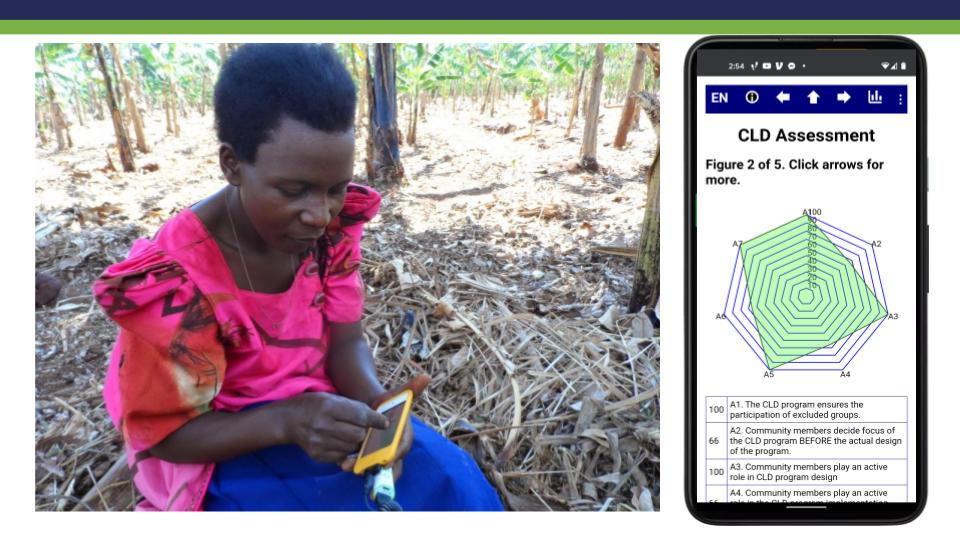Originally published February 22, 2022 by the USAID Learning Lab at this link.
Community-led development (CLD) is quickly becoming one of international development’s most prominent buzzwords. International NGOs, private donors, and governments all over the world are examining ways to realign their development efforts with principles that emphasize the role of participants and communities at every point of a program’s design, implementation, and evaluation processes. A greater embrace of the idea of CLD has not necessarily meant that NGOs and funders have gained confidence to implement CLD. In particular, in the area of monitoring and evaluation (M&E), existing methodologies are rarely equipped to respond to local needs, adhere to data sovereignty principles, or successfully test and appropriately validate CLD efforts. To respond to this gap, the Movement for Community-Led Development (MCLD) – a consortium of 72 international NGOs and over 1,500 local Civil Society Organizations – has launched two new tools: the Participatory CLD Assessment Tool and the CLD Evaluation Tool (also referred to as the Evaluation Quality Appraisal Tool).
The Participatory CLD Assessment Tool seeks to improve program practice by providing practitioners with a rubric with nine dimensions that community members, leaders, service providers, and program staff can use as a participatory exercise to understand how their activities stack up against characteristics of CLD. The CLD Evaluation Tool ensures that CLD program evaluations, regardless of the quantitative, qualitative, or mixed methods used, are both rigorous in design and execution and true to CLD principles. Together, these tools can help organizations improve their CLD confidence and competence over the entire course of program design, implementation, and evaluation. Not only can these tools help organizations design future programs and evaluations consistent with CLD, but these tools themselves were also designed through a participator process.
These tools were collaboratively developed and tested by a team of 35 M&E and CLD practitioners from 23 organizations and are available online in multiple languages. The tool development process was iterative, drawing from practitioners’ lived experiences, literature reviews, and expert advice. Each tool, once developed, was pilot tested on the same set of evaluations. MCLD recruited external users, junior and experienced, to see how the tool was understood both by those unfamiliar with the CLD as well as those who are seasoned CLD and M&E professionals. MCLD conducted inter-rater reliability testing to establish whether the items and dimensions of the instruments were stable.
As expected from any CLD practice, the development of the MCLD’s tools is ongoing and iterative. By continuing to interact with users, gather feedback, and make changes, the tools have become more robust and better able to encourage facilitation. These ongoing feedback loops not only allow tool developers to identify ways to continually improve the tools, but also expose the tools’ fundamental strengths. For example, One Village Partners used the CLD Assessment Tool to assess their projects’ CLD status and create a dialogue among local actors on improving implementation. They described its use as “a humbling exercise,” and emphasized its value, stating “it’s very important that these types of tools exist to do these self-assessments.” In this 15 minute video Outreach International, a US-based INGO, explains how and why they decided to use the tool across all its programs and with all its partners.
Since January 2021, when MCLD launched the tools, just the Excel versions have been collectively downloaded over 1,900 times. Meanwhile organizations all over the world are using the mobile version of the Participatory CLD Assessment Tool. Based on popular demand, MCLD is now offering a certificated five-hour training to any local and international organization that wants to explore and use the tools.
For more information on the process of how we developed these tools, please read: Community-Led Development Harnesses the CLA Approach: The Case of Collaborative Research from 35 MERL Practitioners from 23 Organizations
For more information on the training, please sign up here: https://mcld.org/research-trainings/
If you are interested to work at the intersection of CLD, MERL, localization, and expanding participation in the M&E process, please reach out to gunjan.veda@mcld.org.
This blog was written by Movement for Community-led Development MERL practitionersrepresenting Global Communities, Outreach International, Pact, Relief International, The Hunger Project, and World Vision US.


